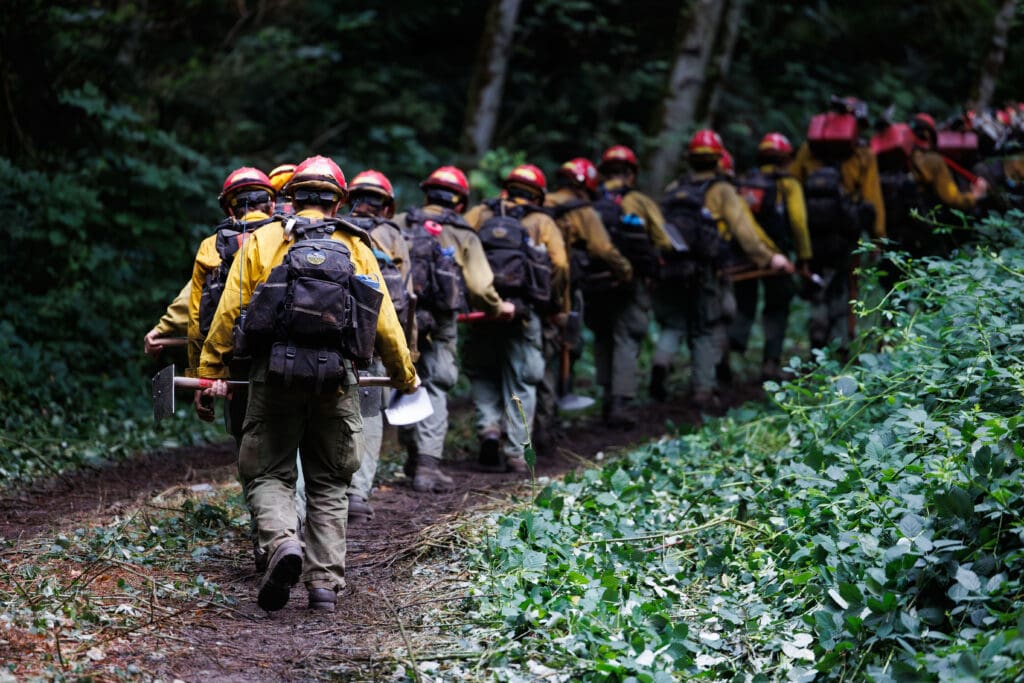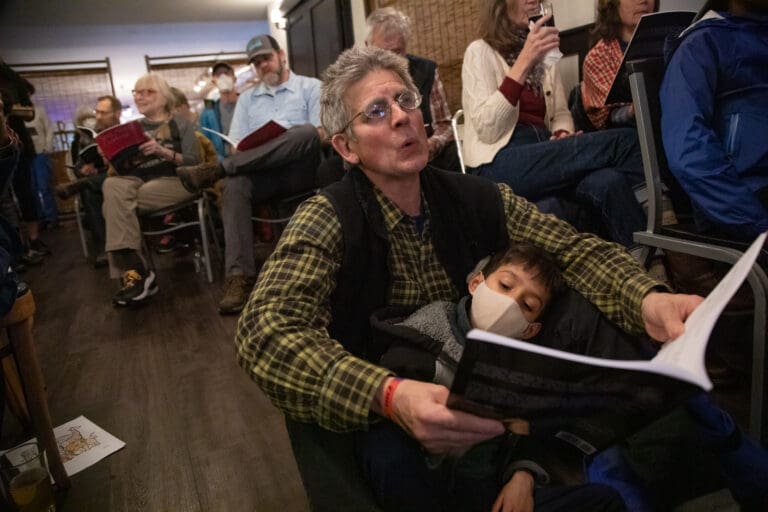When we hit the online “LIVE” button for an all-new, digital daily, print-weekly news organization on Jan. 24, 2022, Cascadia Daily News launched with a concerted mission: Fill part of a news void in northwest Washington state with a fiercely independent, locally owned and managed, broad-based publication, shining light on a wide range of local public life. Nearly a year later, we hope that our first 12 months of work show some solid steps in that direction. Presented below is a review of what our newsroom reporters, editors and photographers consider to be the most memorable and important examples of that work — a glimpse at a year in the life of people in a place we are proud to call home.
—Ron Judd, executive editor
News

Breaking news
Cascadia Daily News was on the scene of several major Whatcom and Skagit county events this year, delivering breaking news gleaned from officials, witnesses and those affected.
In March, a Burlington Northern Santa Fe freight train derailed on the Swinomish Reservation in Anacortes, leaking an estimated 5,000 gallons of diesel mostly onto a berm. Cleanup crews removed approximately 2,100 cubic yards of contaminated soil and about 4,300 gallons of groundwater from the site.
Later that month, unrelated to the train derailment, a judge ruled that by increasing the number of trains traveling through the Swinomish Reservation without the tribe’s written approval, BNSF knowingly violated an agreement between the two entities.
The famed orca Tokitae died in captivity in August. It was a loss grieved by members of the Lummi Nation, who consider all the Southern Resident orcas their “relatives under the waves.” The tribe fought to have Tokitae returned from the Miami Seaquarium. While they were unsuccessful securing Tokitae, her ashes were returned to the tribe and spread at a sacred spot in a traditional water ceremony that was closed to the public.
In late August, a lightning strike started a wildfire on the southeast shoreline of Lake Whatcom. Nearby homes were issued “Level 2” evacuation notices, and multiple state and federal resources were brought in to battle the blaze, including the Baker River Hotshots. The fire grew to an estimated 45 acres at its largest, and was 90% contained less than a week after it began.
The first public notification of the wildfire came 16 hours later than the initial 911 call. Residents living closest to the fire said they largely found out about it from neighbors, friends across the lake who could see the flames or photos shared on social media. The Whatcom County Sheriff’s Office’s Division of Emergency Management and other county officials were unaware of the fire until the Department of Natural Resources notified them about 16 hours after the initial 911 call, leading to critiques from some community members about the response and notification time.
In mid-December, a fire gutted the historic Terminal Building in Fairhaven, necessitating a demolition of the 135-year-old historical structure that housed the Harris Avenue Cafe and The Old Independent Coffeehouse.
Cafe owner Nate Breaux was declared missing the day after the fire started. Crews spent the week leading up to Christmas searching for “potential victims” of the fire, but needed to wait for the arrival of containers to remove asbestos-containing materials from the site. The unstable conditions of the building and a partial collapse made recovery efforts more difficult.
Crews resumed their search of the building and recovered a body on Tuesday, Dec. 26. Officials as of publication time did not confirm the identity of the recovered body. Breaux’s family led a small prayer ceremony on Tuesday, thanking workers on site for their dedication in searching for him.
—Audra Anderson

Elections
Whatcom County’s 2023 elections showed voters wanted change in some cases, but in others cast ballots for more of the same.
Cascadia Daily News led a Citizens Agenda project for the second year in a row, featuring reader-posed questions that were answered by candidates through interviews and stories. In October, CDN published a Voter Guide that included written candidate responses to reader questions and editorial-board endorsements.
County Executive Satpal Sidhu earned another four years in office, as did county council member Ben Elenbaas and Bellingham City Council members Hannah Stone and Dan Hammill.
And in Ferndale, voters once again preferred Greg Hansen for mayor over Jon Mutchler. Hansen ousted Mutchler from the mayor’s seat in 2019.
On the other hand, a reform-minded electorate snubbed Sheriff Bill Elfo’s anointed successor, Undersheriff Doug Chadwick, in favor of Donnell “Tank” Tanksley, who is transitioning to the sheriff’s office from his prior role as Blaine’s police chief. Elfo had rankled progressives with his law-and-order mindset and his public embrace of conservative issues in recent years.
Tanksley, a Black man who spent his formative years in Ferguson, Missouri, promised more citizen engagement with his department. The new sheriff also will oversee the early stages of a program to build a new jail, thanks to voter approval of a new sales tax to fund it (see below).
Change is also coming to Bellingham City Hall, where Mayor Seth Fleetwood is packing up his office after just one term. Voters appeared to lay much of the blame for Bellingham’s COVID-19 woes, as well as visible homelessness on city streets, at the feet of the mayor, who was sworn in barely two months before the disease was declared a global pandemic.
Political newcomer Kim Lund will pick up where Fleetwood left off, leading efforts to repair the social and commercial fabric of a city that has been frayed by the weight of increasingly evident social ills, especially downtown.
Bellingham voters also liked two initiatives intended to boost low-income people who face spiraling housing costs. One will raise the minimum wage in the city, while the other requires landlords to help pay tenants’ relocation costs if they raise the rent by more than 8%.
In what may qualify as the biggest non-surprise of this election season, Bellingham voters overwhelming approved a fifth Greenways levy, for acquisition and maintenance of green spaces in the city.
—Ralph Schwartz

Homelessness
Whatcom County recorded 1,059 homeless individuals this year — a 27% increase from 2022, and the highest number recorded in the county since 2008, when the homeless census began.
The data doesn’t show the whole story — county officials say this is likely an undercount — but it is a stark reminder of the growth in the number of community members who live on county streets.
Homelessness impacts a range of populations. Bellingham City Council heard in March about increases in homeless children and families in the county: the Opportunity Council reported seeing a 71% increase in the number of housing applications from households with children from 2018 to 2022. Veterans are also struggling to find and keep affordable housing in the county. And with increased numbers, nonprofits are struggling to keep up with the demand. Lighthouse Mission restricted day services at the 200-bed shelter Base Camp due to increasing needs, and an increasing complexity of needs in their clientele.
The increase in numbers has impacted downtown and city businesses. Some have complained about people driving away customers and scaring employees with public drug use and loitering. Many employees do what they can to help out people who are struggling, but also want to see more services.
The City of Bellingham in October produced a downtown safety report, which outlined the progress the city’s made over the last two years to address public safety concerns in the downtown core, as well as future efforts. Increased police foot patrols and cleanup work in alleys and parking garages were included in that report.
But progress is being made, and hope exists, despite the challenges. Construction started in August on the Way Station, a new service center for unhoused people that will provide 17 respite beds for patients, as well as bathrooms, showers and laundry facilities. It is scheduled to open in 2024. The city increased shower services with a new shower trailer behind City Hall, operated by the Opportunity Council’s Homeless Outreach Team. The city, county and nonprofits teamed up to put together a winter shelter, two severe weather shelters and some emergency shelters for women this winter as temperatures dropped.
—Charlotte Alden
Top stories:
● Whatcom County reports highest homeless number since census began
● Downtown workers don’t feel prepared to handle crisis on their doorsteps
● Bellingham’s invisible housing crisis: homeless children
● Officials break ground on center for unhoused people
● Memorial honors homeless people who died this year in Whatcom County

Jail
To the uninitiated, the question put before Whatcom County voters this November might have seemed simple enough: To build, or not to build, a new jail?
But the ballot measure calling for a 0.2% sales tax to fund new jail construction and social services proved to be perhaps the thorniest and most complicated issue in the county in 2023.
Government leaders had failed over the past decade to find a winning formula for their jail proposals, intended to replace the undersized and deteriorating downtown Bellingham facility next to the courthouse that officials often called “inhumane.” Voters, who had rejected a similar measure twice since 2015, demanded a more robust effort to provide behavioral health services and reduce incarceration rates.
While this year’s proposal had its vocal skeptics, it also had support across the political spectrum and won in a nearly 2–to–1 vote.
Election observers said the county finally got the social-service piece right, promising a hefty investment in behavioral health care after a four-to-six-year period of paying down the debt on the jail construction bond.
Voters also saw a growing need for the types of programs the money would pay for, with homelessness, mental illness and drug addiction becoming more visible and more deadly since the last jail vote in 2017.
Since the onset of the COVID-19 pandemic crime also has been on the rise, possibly convincing some voters — even those in progressive Bellingham — of the need for a bigger lockup.
Somewhat anticlimactically, the dramatic election victory for jail proponents will be followed by years of waiting before anything materializes from the new sales tax revenues. The jail itself won’t be completed until 2028 at the earliest. The facility’s size and cost are still unknown.
—Ralph Schwartz
Top stories:
● Beyond Bars: The future of justice in Whatcom County
● Election analysis: Support for Whatcom jail proposal broad, deep
● After years of waiting, approval of jail measure means … more waiting
● Whatcom jail proposal leaves voters with questions
● At 11th hour, Whatcom jail proposal faces competing demands

Housing
The City of Bellingham in July declared a “housing crisis” due to rising homelessness, an inadequate supply of affordable housing and a brutal housing market.
Data backs up the extent of the problem. According to a city report, 54% of renters in Bellingham pay more than 30% of their income for rent. Thirty-one percent of all renters pay more than 50% of their income for rent.
This year, some seniors made headlines for their advocacy on affordable housing. The same city report found 63% of all seniors who rent pay more than 30% of their income for rent. Low-income seniors who reside in Eleanor Apartments have continued advocacy to improve affordability at their Low-Income Housing Tax Credit building, where rent has risen most years. Many of the issues with housing in Bellingham stem from the federal government, which hasn’t funded new public housing since 1973, according to the report.
The end of pandemic-funded rental assistance programs in June was an additional blow. The Opportunity Council’s Homeless Prevention Program to provide some rental assistance and case management to qualifying households launched in August and filled up quickly as the agency received thousands of phone calls from people trying to get connected. A new rental assistance program targeted at rent-burdened seniors and families with children will help some but will not be able to meet the need of those who aren’t able to afford their rent.
Recourse for renters may be coming. Voters in November approved a renter relocation initiative, which will require a landlord who raises rent by more than 8% to pay tenants three month’s rent to help them relocate. The city is also exploring a range of proposals that expand tenant protections and ensure rental properties are habitable, including potentially hiring eight additional rental inspectors to supplement the city’s single rental inspector. However, it could come at a steep cost: the city estimated that hiring those inspectors could cost $1.2 million.
—Charlotte Alden
Top stories:
● Bellingham declares housing crisis
● Seniors face rising rents in ‘affordable’ housing
● Demand for rental assistance dwarfs available funding
● Minimum wage increase, rental relocation initiatives hold leads Wednesday night
● Bellingham landlords may see stiffer penalties for substandard housing

Environment
This year Cascadia Daily News covered a range of critical environmental issues reflecting the complex interplay between nature, industry and community in the region.
In a CDN Special Report, “Off Target,” former staff reporter Julia Lerner provided a deeply reported look inside the Whatcom County-managed Plantation Rifle Range, exposing decades of lax attention to the dangers of toxic lead in the ground and a local stream that drains into Lake Samish. At year’s end, government reporter Ralph Schwartz noted that the county council was still grappling with the expensive cleanup and a plan to reopen the facility.
A recurring issue in the City of Bellingham was the aging treatment plant at Post Point, which went back to square-one from an earlier planning phase that prompted eye-opening cost estimates. At year’s end, four companies had answered the call for innovative ideas to start from scratch on solving the puzzle of upgrading the city’s aging wastewater treatment plant.
Sewage also caused a stink across town, where leakage from pipes that have been pushed beyond their useful life at Western Washington University forced organizers to cancel the annual Fall Harvest Jubilee at the student-led Outback Farm this fall.
Endangered salmon populations across Washington also made headlines as their numbers continued to drop, despite ongoing recovery efforts. However, local tribal efforts along the Nooksack River were lauded as advancements.
Both the Nooksack Indian Tribe and Lummi Nation in April were told they would receive millions of dollars in funding for projects targeting environmental resiliency, salmon populations and flood risk through the Climate-Ready Coasts Initiative.
Salmon weren’t the only fish to end up in ink this year, with the state Fish and Wildlife Commission rejecting a petition to reopen a retention season for cutthroat trout on Lake Whatcom and the failure of Cherry Point herring population to spawn this year.
Whatcom County trees also ended up in the paper this year – though not literally. The adoption of a new conservation easement in July resulted in Bellingham’s Hundred Acre Wood officially being protected permanently.
Brokedown Palace, a 69-acre Department of Natural Resources tree stand along the Middle Fork of the Nooksack River, did not find the same security, despite the timber sale being paused. Following the auction being blocked for a second time, activists locked themselves together inside the DNR building in Olympia at the end of June.
The group was demanding a logging ban of legacy forests, such as Brokedown Palace. About six months later, it was announced the Brokedown Palace stand was among more than 650 acres of mature forest slated to be conserved with funds from the Climate Commitment Act.
Whatcom County forests also faced pressures from fires this year, which saw the Sourdough wildfire burn a total of 6,369 acres. The fire was started by lightning in North Cascades National Park in eastern Whatcom County.
The future of BP’s Cherry Point facility looked a little brighter this year after it ended up on the short-list as a potential hub for sustainable aviation fuel and green hydrogen facilities — part of a $1.5 billion investment the company has proposed making at the Whatcom County refinery.
Whatcom County environmental “rabble-rouser” Wendy Harris passed away in August. Harris earned herself the reputation of being the thorn in the side of county leadership in her unwavering fight for clean water and increased habitat and wildlife protections. Citizens said her dogged commitment to environmental causes and her relentless pursuit of truth will be missed.
—Isaac Stone Simonelli

Labor & unions
Unionization efforts in Whatcom and Skagit counties have grown in recent years, with several businesses and organizations filing and certifying union agreements with the National Labor Relations Board in 2023. And, given the history of the Industrial Workers of the World union (IWW) in Bellingham, it should be no surprise to see Wobblies’ out there supporting local workers.
Most recently, Western Washington University’s Operational Student Employees filed to unionize. These employees have been struggling with “low and late pay, unsafe work environments, unpredictable schedules and the need for a voice at work,” prompting the unionization efforts, according to a news release. About six months earlier Academic Student Employees at Western voted overwhelmingly to form a union.
Employee safety and pay were also at the core of Macy’s union employees’ strike during Black Friday weekend in Bellingham, Lynnwood and Tukwila.
Other national chains, specifically Starbucks and REI, saw local unionizing efforts. Though it’s been more than a year, local employees said in September that lawyers for Starbucks have been unwilling to meet them at the bargaining table.
Workers at Bellingham’s REI Co-op voted to unionize in June, making it one of just two unionized REI locations on the West Coast. Employees voted 40-12 to join United Food and Commercial Workers Local 3000 – the same union Macy’s workers in the region are part of.
PeaceHealth saw some workers also vote to unionize after NLRB counted ballots returned from advanced care providers at two hospitals in Whatcom and Skagit counties. Nearly 90 physician assistants, nurse practitioners and certified midwives filed for union status in July this year, citing increased pressures from management to fit more patients into their schedules to boost revenue.
—Isaac Stone Simonelli

PeaceHealth
Local health care agency PeaceHealth emerged from the COVID-19 pandemic taking some hits — both to its finances and its public image.
Saying its revenues were failing to keep up with rising costs, Whatcom County’s largest health care system decided to cut several programs its patients deemed vital, including its allergy clinic and outpatient palliative care.
The decisions alienated not only PeaceHealth’s patients but also key allies in the health community.
“This latest loss seems particularly poignant to me because I can think of no service that is more closely aligned with the hospital’s proclaimed ‘healing mission of Jesus Christ’ than the social support and relief of pain and suffering provided by the palliative care team,” retired physician David Lynch wrote in a guest column published in Cascadia Daily News in July.
In a statement in September, PeaceHealth admitted it had rushed its decision to cut the palliative care program and failed to consult members of the PeaceHealth St. Joseph Medical Center Foundation board and others who helped launch the program in 2018.
“PeaceHealth apologizes for the angst this caused,” the statement said.
With the help of the foundation, PeaceHealth restructured outpatient palliative care and began offering the program again in September.
“We are ramping up to full operations and are on target to reach more than 30 patients per month in the new year,” PeaceHealth Medical Group CEO Scott Foster said on Dec. 19.
Angst over PeaceHealth also figured prominently in the November election, after CDN readers participating in the Citizens Agenda project identified the issue as one of the most pressing public concerns as they interviewed candidates and filled out ballots.
Meanwhile, Dr. Ming Lin, an emergency room physician who lost his job at St. Joe’s in 2020 after speaking out against the hospital’s COVID-19 safety practices, kept applying the heat on PeaceHealth in 2023. Rather than taking an anticipated multi-million-dollar settlement from the health care system, Lin pressed forward with his lawsuit against PeaceHealth, even after his lawyers, initially supplied by the ACLU, had dropped him. A jury trial is slated for October 2024.
The agency also has been penalized this year for violating state rules.
The Attorney General’s Office sued PeaceHealth after its investigation revealed that the health care system failed to inform patients of financial assistance before billing them. PeaceHealth agreed to refund $13.4 million to more than 15,000 low-income patients.
In October, the Department of Ecology fined PeaceHealth $21,000 for once again violating the state’s dangerous-waste handling laws. PeaceHealth had to pay a similar fine in 2018.
—Ralph Schwartz

Fentanyl & addiction
The highly addictive and deadly drug fentanyl made headlines throughout the year.
In April, grieving parents who had lost their children to the drug shared their stories of frustration and loss.
They also raised their voices before the Bellingham City Council, demanding a stop to flagrant drug use on the city’s streets. The council responded with a ban on public drug use, which passed in April in a split vote.
One month later, the Washington State Legislature criminalized drug use and possession after convening a special session to address the issue.
The justice system declared some momentary victories in the fight against fentanyl, including the arrest of a suspected leader of a drug ring based out of a homeless camp near Bellingham’s Walmart, and the sentencing of a major supplier whose territory included Whatcom and Skagit counties.
Even with all the drugs seized by law enforcement, much more found its way to the streets, killing people in Whatcom County in growing numbers in 2023. Through November, the county had recorded 117 confirmed and probable overdose deaths — more than the 91 deaths for all of 2022. The number of fatal overdoses in the county in 2021 was 44.
In response to the drug epidemic, the county decided to spend $100,000 in COVID-19 relief funds on a bulk purchase of fentanyl test strips and naloxone, commonly known as Narcan, an opioid-overdose antidote in a nasal spray that can reverse overdoses.
Lummi Nation declared an emergency in September after at least seven tribal members died of overdose in a two-week period. In December, during a trip to the White House, Lummi Chairman Anthony Hillaire urged President Joe Biden to declare a national fentanyl emergency, to remove barriers to tribes’ efforts to combat the crisis.
—Ralph Schwartz

Waterfront future
Bellingham’s downtown waterfront remained very much a work in progress by the end of 2023, but development at the 137-acre site once occupied by a pulp mill did take a couple steps forward — and a couple steps back.
Not everyone liked some of the steps forward.
At the start of the year, new activity at the Bellingham Shipping Terminal kept South Hill residents up at night, literally, as ABC Recycling began noisily loading its scrap metal onto vessels until 3 a.m.
Port officials called their new tenant a win for their working waterfront, but neighbors called it a nuisance that must be stopped. ABC caused further upset by announcing plans to build a metal shredder in the Alderwood area in a part of town that has shifted over time from industrial to residential.
Neighbors of the proposed shredder, packing an informational meeting in early December, told ABC officials in no uncertain terms to go back to Canada.
The ceremonial groundbreaking of Millworks in April marked a much less controversial waterfront development — 83 units of affordable housing on some of Bellingham’s most premium real estate.
As for the steps backward, the Irish firm Harcourt Developments continued to disappoint, missing a deadline to complete two condominium buildings and losing the rights to build on 5.3 acres of adjacent property. It’s back to the drawing board for that portion of the downtown waterfront.
Ever since the demise of Georgia-Pacific, locals have been calling for public access at the waterfront. With that in mind, Port officials have said more than 30 waterfront acres will be kept as parkland, including the area where the Pump Track now sits. The adjacent, expanding container village now promises to be around for years to come.
Public access and other uses at the waterfront remained constrained, however, because more environmental cleanup is needed in Whatcom Waterway. The state Legislature budgeted $17.7 million for that purpose during its 2023 session.
CDN published the first of a special series on the area’s working waterfront, detailing a vital part of Bellingham’s past – and crucial decisions to come for the future.
—Ralph Schwartz

Law & justice
Cascadia Daily News published a Special Seport in January about the death of Concrete resident David Babcock, after he was fatally shot by police in 2022. Babcock’s death resulted in an independent investigation into the actions of Sedro-Woolley Police Officer Max Rosser, who was cleared of any wrongdoing and returned to his job in November 2022. CDN detailed the findings of the 308-page report.
Nine people in Whatcom County Jail were without representation in May, in what a public defender called a “a violation of their rights.” The defendants could not afford their own attorneys. They qualified for public defenders, but that office wasn’t allowed to take them on due to conflicts of interest.
In Blaine Municipal Court, a story highlighted the innovative “one-stop-shop” for defendants that prioritizes rehabilitation over incarceration whenever possible.
Fired Bellingham Detective Adam “Bo” McGinty was charged with a felony after he was accused of using a co-worker’s dry cleaning allotment. In the weeks after his August termination, McGinty was revealed to have been given an unauthorized vehicle escort and flag-raising ceremony, traditional law enforcement honors. Police Chief Rebecca Mertzig said she was “disappointed to find an unsanctioned escort and flag raising took place.” He pleaded not guilty in December to a felony related to the misappropriation of funds.
Several community figures were arrested and charged this year for crimes related to the sexual abuse of children. Wil James, the former ceramics director at Jansen Art Center, was charged with six felony counts of sexual abuse in Cascade County, Montana.
Tana Perkins Reneau, a Blaine School Board candidate in the 2023 primary election, was charged with first-, second- and third-degree rape of a child, and four counts of second-degree assault of a child. Reneau allegedly abused and tortured her adoptive and foster children. She pleaded not guilty.
Bellingham resident Brian Drake, 31, is accused of more than two dozen felonies, including child rape, child molestation, and incest. His brother, Aaron Drake of Yellowstone County, Montana, was arrested on 15 similar charges. Brian Drake pleaded not guilty in September.
—Audra Anderson
Top stories:
● Sedro-Woolley officer returns to force after killing motorist; lawsuit looms
● Whatcom Superior Court finds judge acted in error, can’t hear 123 DUI cases
● Blaine Municipal Court makes resources more accessible for defendants
● Fired Bellingham detective gets hero’s send-off with unauthorized flag raising, vehicle escort
● Former Lynden ceramics director charged with felony sex crimes in Montana

People

Education
County wide, school districts grappled with budget cuts. The loss of federal COVID-19 pandemic funding, an increase in the costs of resources and compensation and a drop in regionalization factor (for some districts) resulted in layoffs and loss of programming.
Ferndale High School opened its new academic wing, and work continues to expand Career and Technical offerings through new courses and a proposed skill center next to Meridian High School. In the fallout of the pandemic, districts continue to grapple with mental health and safety.
At the state level, Transition to Kindergarten was codified and funding expanded for special education. Meals were made free for children in kindergarten through fourth grade.
The Bellingham school district grappled with criminal and civil charges against three assistant principals related to a student reporting allegations of sexual assault. The criminal charges were resolved in court in December, when the Whatcom County Prosecutor’s Office agreed to dismiss charges of “failure to report” on condition of community service and a letter in which they acknowledge that they should have acted differently. The school district backed the three administrators throughout the process.
School board elections this year were contested and heated, with partisan politics trickling down into local races. Some incumbents were ousted and some voters in Lynden, Meridian and Ferndale opted for candidates passionate about parents’ rights and curricula about sex, race and gender over those hoping to keep hot-button political topics out of school board elections.
Western Washington University faced its own budget cuts in the spring following a $10 million budget deficit, but Western and other post-secondary institutions in Whatcom County are seeing reassuring trends in enrollment after pandemic challenges. Western saw its second-largest new freshman class this fall, and Whatcom Community College also saw an enrollment rebound. Northwest Indian College, which celebrated 40 years in 2023, saw a record number of students enrolled this fall quarter.
Also at Western, one professor went viral for identifying the “Swift Quake” and the university was flagged for holding Native remains.
—Charlotte Alden and Hailey Hoffman

Opinion
CDN’s Opinion page became an even more active sounding board for a broad range of public issues. Reader involvement skyrocketed in 2023, with staff and public voices weighing in on everything from local election issues to national politics.
Columnist Ron Judd, CDN’s executive editor, started the year by lobbing a missive at the local institution of higher learning, Western Washington University, for a historic failure to address misperceptions about one of its formative presidents, Charles H. Fisher. (Current administration officials reached out for dialogue and a plan to educate the public on same, but nearly a year later, the Board of Trustees has yet to act.)
He also penned a popular tale about to a favored old subject, Boeing’s original 747, upon retirement of the airframe, warned people off from the local tulip festival, issued a stern directive for shorter letters to the editor and declared himself fit to serve in any new war on press freedoms. Other columns nearer year’s end called for more consideration of public supported indoor rec facilities and a demand for more transparency from Bellingham Public Schools.
CDN letter writers set volume records throughout the year, leading to previously unimaginable weeks in which the newspaper published more than 7,000 words of letters (each less than 250 words) in the runup to November’s election. Hot topics: PeaceHealth, the Whatcom Jail, and everyone’s favorite candidates.
The same pattern held true in guest commentaries, where smart local folks weighed in every week of 2023 on everything from forestry practices to the rights of defendants to grizzly bears and (memorably) saving the Arctic National Wildlife Refuge and the civic importance of the Juneteenth holiday. But the biggest guest commentary topic by far? The jail, which prompted 10 guest commentaries on its own, followed closely by PeaceHealth, which drew about half that, with one particularly well-read piece calling out the organization for betraying its past ethics.
—Ron Judd
Top stories:
● Unapologetically grasping for the ‘wit’ in ‘dimwitted’
● Suggested Bellingham schools course: Intro to Public Accountability
● Guest commentary: Greenways is great, but what about indoor rec?
● It’s time to protect the Arctic National Wildlife Refuge
● Memo to WWU: It’s past time to correct the record on Charles Fisher

Business
Perhaps the most significant local business development of 2023 was something that didn’t happen: a recession, feared in late 2022 to be ahead in the new year, never materialized.
Still, a number of notable business stories woven throughout Cascadia Daily News’ coverage — from retail to real estate — did have visible movement or reach a conclusion this year, and several profiled Northwest Washington businesses and people continued to make news after their initial stories were told.
—Frank Catalano

News photos
Our 2023 news photography reveals the region’s notable events: From the tragic Terminal Building fire to elections, and coverage of wildfire, homelessness and the fentanyl crisis. We’re also sharing the lighter side: county fairs, holiday fun, and interesting people from Whatcom and Skagit communities. We share some of our top images from photographers Hailey Hoffman, Andy Bronson, and Finn Wendt.
—Rhonda Prast
View the gallery:
Sports

Prep
Whatcom County’s prep sports teams are annually among the most successful in the state, and in 2023, local athletes combined for 33 team and individual state championships.
Skagit County also flexed its muscles in early December when Anacortes High School football claimed its first-ever state title, wrapping up a five-year rebuild that began with the team opting to field only a junior varsity team. It was an unusual story that saw the community rally around the program.
Bellingham swimmers Miles Cratsenberg and Grace Sorensen captured a pair of individual state championships nine months apart. Cratsenberg, who also won the Swimmer of the Meet award at the 2A boys state meet, won the 200- and 500-yard freestyle events in February. Sorensen won the 200-yard freestyle and 100-yard butterfly at the 2A girls state meet in November.
Mount Baker’s Elijah Washburn capped off his high school wrestling career with a Class 1A 170-pound title in mid-February, and Washburn was joined by 17 other local medalists at the Mat Classic XXXIV.
In March, local prep basketball teams captured three state titles for the second straight year. The Nooksack Valley girls team dethroned Lynden Christian, which had won the previous two championships, for its first-ever gold ball. The Pioneers were led by one of Whatcom County’s most coveted hoops prospects, Devin Coppinger, who committed to the University of Washington five months later.
The Lynden Christian and Lynden boys basketball teams each secured back-to-back championships, while the Blaine boys also placed third — their best finish since 2000.
Just a month after the local hoops success, a former Whatcom County prep star, Stephanie Soares, saw her professional basketball dreams realized when she was drafted No. 4 overall in the 2023 WNBA Draft.
Spring is where the titles really piled up. Across just three sports, Whatcom County athletes won 25 state championships — 19 from track and field.
The other six came from boys tennis and girls golf. Sehome boys tennis swept the singles, doubles and team titles at the 2A state tennis tournament, while the Mariners’ girls golf team also won the 2A team championship. Lynden’s Logan Medcalf captured the 2A boys state championship and Ferndale’s Baylor Larrabee won the 3A boys state title.
Lynden’s baseball team, in its first 2A state championship game since 2012, fell short in a walk-off loss to Tumwater. A win would have completed the boys prep “Triple Crown” — winning a state title in football, basketball and baseball in the same season.
In September, fans were reminded of how sports — and those who promote them — impact our lives. Mark Scholten, a beloved sports radio personality in the county, died at the age of 54. His death left a void in the hearts of many who tuned in to his prep sports broadcasts daily.
—Connor J. Benintendi
Top stories:
● Ahead of his time: Bellingham swimmer has Olympic dreams
● Mark Scholten’s death leaves void in local sports radio scene
● Anacortes football’s rise to power was 5 years in the making
● How a UW commit became one of Whatcom County’s hottest hoops prospects
● No. 4 pick in WNBA draft brought Mount Baker first state championship

College
Strong 2022 finishes by Western Washington University’s women’s soccer and basketball programs created high expectations for the coming year. The soccer team had won its second national title; the basketball team had reached its first-ever NCAA Division II National Championship game.
Anything short of that in 2023 arguably would be a disappointment to players.
But the soccer squad lost to Simon Fraser in a shocking upset in the Great Northwest Athletic Conference championship — falling short of the NCAA Division II tournament. Western finished the season 12-5-4 after completing its 2022 title-winning season at 19-2-4.
And the Western women’s basketball team suffered a crushing defeat in the opening round of the West Regional tournament in March. Still led by star forward Brooke Walling and 33-year veteran coach Carmen Dolfo, Western, which is 9-2 so far in the 2023–24 season, is looking to get back to national relevance this season.
Despite that, there were numerous historic achievements in 2023 by Vikings in various sports. Perhaps the top finish was Western men’s golfer Jordan Lee’s second-place finish at the NCAA Division II National Championships — the highest placing by a Vikings golfer in 10 years and the second-best in the team’s history.
More recently, Western’s cross-country teams were the surprise of the year. Nearly a year after legendary coach Kelven “Pee Wee” Halsell wrapped up his 36-year career, the women’s team captured its first West Regional title and went on to take 14th at the national meet. Ashley Reeck led all Western runners with her 30th-place national finish, and the women Vikings posted their best season since 2015.
Western’s men’s team finished 16th, led by Andrew Oslin, who finished 88th individually.
The Vikings’ softball team, led by star pitcher Mareena Ramirez, had a promising season end, also in the GNAC title game, falling 3-2 to Northwest Nazarene in an unfortunate, one-score thriller.
Off the court, field and course, Western honored nearly 200 former female athletes with varsity letters — part of a Title IX ceremony that highlighted the university’s Back2B’ham Alumni and Friends Weekend.
While 2023 may not have lived up to the competitive expectations set by 2022, Western’s premiere programs notched yet another year among the nation’s top schools at the Division II level.
—Connor J. Benintendi

Recreation/outdoors
Like most Bellingham residents, CDN’s staff spends a good amount of time recreating outdoors, often contributing tales of sunny or, more often, damp exercises to online and print pages.
In 2023, CDN once again led the way with comprehensive coverage of Whatcom County’s annual outdoor-recreation highlight, the Ski to Sea race from the slopes of Mount Baker to Post Point in Fairhaven. The newspaper’s team coverage, provided by the entire newsroom staff, followed the race through every leg.
Another highlight was CDN digital editor/designer Jaya Flanary’s summertime three-piece ode to the community, and history, provided by Puget Sound bowling centers: Time to Spare: Bowling clears a lane for sport, community.
Columns shared by Cascadia Daily News outdoor writers Elliott Almond, Jason D. Martin and Kayla Heidenreich in 2023 included day trips, can’t-miss hikes, changes in the local recreation scene and firsthand descriptions of day-to-day life in far-flung places.
Bellingham-raised Heidenreich, a former CDN intern, recapped her first year living in Juneau, Alaska in a recent column, offering a glimpse into what many of us couldn’t ever imagine doing: living in an oft-frozen, yet beautiful state. It’s been interesting to see how Heidenreich’s perspective has evolved since arriving just over a year ago.
Almond, a retired veteran sports and investigative journalist, has written about nearly everything outdoors related in Whatcom County and beyond, and he began 2023 by profiling Whatcom County’s new parks and recreation director, Bennett Knox — a crucial local position that hadn’t changed hands in 20 years.
Between important community stories, Almond provided deep historical dives on recreational getaways, told the story of feats by local paddlers and even gave readers a glimpse into what happens when his own adventures don’t go as anticipated. He also reported and wrote a detailed take on an infamous mountain biker vs. hiker incident that occurred on a local trail, resulting in assault charges against one man and a serious injury to the other.
Perhaps his best piece of the year was a remarkable tale of how a group of heart surgery survivors, under the umbrella of Wildhearts Bellingham, have come together to form a hiking and support group.
But recommending hikes may be what Almond does best. A few of note this year: Goat Peek Lookout and “Larch Madness,” lesser-known adventures on Orcas Island and a pre-spring trip on snowy Artist Point.
Martin shared his opinions on many topics, including recalling how he became an Eagle Scout and more about the organization’s past. As a climbing expert, Martin gave a look into the ins and outs of the activity’s culture and what developments impact those who do it. He also explained why ski passes cost so much.
We also shared a story about Mt. Baker Ski Area’s quest to become more sustainable.
CDN put a bow on another outdoor staple, rowing, at year’s end with “Our Boys in the Boat,” a comprehensive series of stories about the legacy of two legendary Northwest Washington rowers, Don Hume and Gordy Adam, who came back to life in their own way via George Clooney’s film version of the bestselling book, “The Boys in the Boat.”
—Connor J. Benintendi

Sports photos
Sports can generate and instill all the emotions: joy, disappointment, agony, resilience and determination. Cascadia Daily News staff photographers Andy Bronson, Finn Wendt, Hailey Hoffman and visual interns captured many of those memorable moments in 2023 with skill and sensitivity. We share them here
—Connor J. Benintendi
View the gallery:
Living

Arts & entertainment
Bellingham isn’t a metropolis, but the city of approximately 92,000 sure acts like it is. From live music to theater, art exhibits, independent cinema and comedians, it’s rare to find a night of the week when something isn’t happening.
In 2023, festivals of various stripes drew crowds, including the inaugural Bellingham Exit festival, which was considered a smashing success by CDN music columnist Jesse Stanton. In January, he reported the Bellingham Folk Festival returned with a relentless lineup of quality performers, both local and national. July brought coverage of the NW Tune-Up Festival.
Film festivals also made appearances this year. In April, we interviewed Academy Award-winning director Barbara Kopple in advance of her visit to the Cascadia International Women’s Film Festival, and the perennially popular Doctober film festival returned to the Pickford Film Center for its 16th year during the month of October.
Of course, not all A&E news was centered in Bellingham this year. Columnist Margaret Bikman reported on Damond Morris taking over for Roger Gietzen at the historic performing arts venue, Mount Vernon’s Lincoln Theatre. Writer Christian Martin paid tribute to beloved Skagit Valley author Tom Robbins, whose hometown of La Conner threw him a parade and daylong party in August.
Also of note in 2023: The return of the Fairhaven Summer Repertory Theatre; features on area artists such as Francis X. Donovan; the opening of the Helen Loggie Museum of Art in the former Territorial Courthouse in Bellingham’s Old Town; and the addition of an Old Town Art Stroll on the fourth Saturday of every month.
Plus, the Jansen Art Center in Lynden got a new leader in September.
—Amy Kepferle

Food & restaurants
Restaurant-focused stories that stood out in 2023 weren’t always straight-up reviews of eateries located in Whatcom and Skagit counties (although there were plenty of those, too).
For example, a story by CDN Contributor Mark Saleeb in February explored the dearth of late-night venues focusing on food, not drink. “Bellingham rarely shows up for anything after dark that does not involve alcohol,” he wrote, inviting restaurateurs to up their post-sunset dining game.
In May, a story about pandemic-spurred tipping investigated how the service industry had changed, tip pooling and payouts, payment equity and whether it was worth it to get a $5 latte if the only options were to tip 15% or 20%.
Other restaurant-adjacent stories included a Tulip Festival dining guide by Jessamyn Tuttle — something to revisit for next spring — and, in November, we dove into the history and evolution of a 25-year-old diner, Diamond Jim’s Grill, a story that focused on the diner’s new ownership after longtime operator Jim Green handed it over.
General food and drink stories ran the gamut. Ones that stood out included the spring debut of Common Threads’ food truck, which serves free fare to area youth via their mobile eatery; the return of Bellingham Beer Week in April; and a fascinating profile of Lynden’s Steensma Creamery by CDN Assistant Editor Audra Anderson.
One story the entire editorial team had a fun time with was rating Bellingham’s homegrown ice cream, which saw us celebrating July’s National Ice Cream Day by procuring four pints of chocolate and vanilla ice cream (no toppings) from area ice cream purveyors and gathering around a table to taste-test them. As far as assignments go, it was a tasty one.
—Amy Kepferle

Profiles
The profiles in CDN’s Living section are where you will find the heart of the community.
A good example of that is one of Audra Anderson’s stories from last January about Busy B’s, a Bellingham barbershop, and its owner Bernard Franklin, who has turned his salon into a place where all are welcome, regardless of “race, creed, wealth, gender and age.”
Several other profiles stuck with us in 2023.
In March, I visited Dalia Monterroso — the self-proclaimed “President of Chickenlandia” — to talk about her journey from hobby chicken farmer part to YouTube sensation, author, and poultry educator. She discussed everything from food inequity to zoning laws and pointed out she first started keeping chickens to battle postpartum depression.
Stories about Lummi Nation artist Jason LaClair, the community band, Out of the Ashes, the people behind Brigadoon Service Dogs, and longtime Hovander Homestead Park volunteers Bill and Janice Ellingson are also worth a second read.
Loretta Lynn’s “singing sister” in Whatcom County was a late-summer profile that combined a whole lot of local history and had a bit of a fairy tale feel to it. The story focused on Darlene “Peachy” Little, an 87-year-old singer and songwriter who used to fill in for gigs for Loretta Lynn before Lynn left the area and eventually achieved worldwide stardom. Peachy stayed home to raise a family, but never regretted it. Music she had recorded on her own decades ago was rediscovered, digitized, and became the album “The Other Woman.”
As summer turned to fall, we also profiled a local couple who competed on the television show “Lego Masters”; talked to those involved with Knitted Knockers, a nonprofit that provides knitted prosthetics for women who have had mastectomies; and went to Lummi Island to honor World War II veteran and community volunteer Paul Davis. They were all fascinating people.
—Amy Kepferle
